|
|
|
| My Favourite Planet > English > Middle East > Turkey > Ephesus > photo gallery |
| Ephesus, Turkey |
Ephesus photo gallery 1 |
 |
 |
56 of 62 |
 |
 |
|
| |
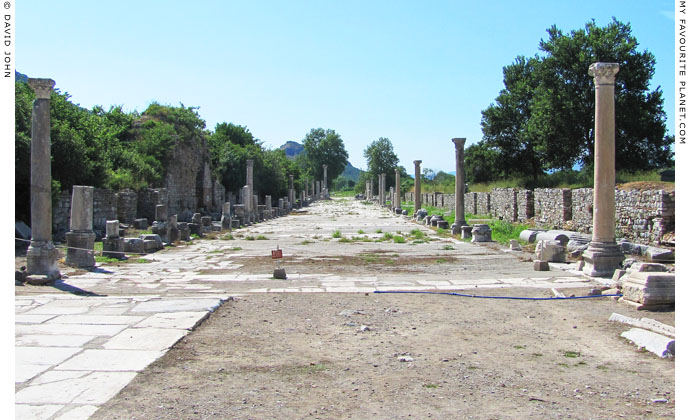
The Arcadian Way between the Great Theatre and the harbour of Ephesus. |
| |
Ephesus Harbour
Ephesus was a strategically important commercial port and a gateway between the Mediterranean and Anatolia (Asia Minor). The ancient harbour, on the west of the city, was artificially enclosed during the rule of King Attalus II of Pergamon (159-138 BC), and substantially developed from the early Roman imperial period when a monumental three-arched gate was added (see image below). Another two gates along the road between the city and the harbour were built in the 3rd century AD.
Apart from the warehouses around the mouth of the harbour, a number of buildings were gradually added, including the Harbour Baths, built during the reign of Emperor Domitian (81-96 AD), the Harbour Gymnasium and the Stoas or Halls of Verulanus (Verulanus Square, 90-110 AD). The Lower Commercial Agora (the Tetragonos Agora) was conveniently situated just to the southeast.
The harbour mouth gradually silted up, and from the 3rd century AD the port was connected to the sea by a canal, on either side of which the Harbour Necropolis developed.
The Arcadian Way, also known as the Arkadiane (η Αρκαδιανή) or Harbour Street, was the main road running east to west between the city and the harbour, starting in front of the Great Theatre. It is is thought to have been constructed during the Hellenistic period, but its present form is the result of a redesign during the reign of Emperor Arcadius (395-408 AD).
The 530 metre long and 11.5 metre wide paved street was lined on both sides by rows of shops within stoas (colonnades) 5 - 5.7 m deep, which ran the entire length. The stoas were supported by marble columns with composite capitals (a mixture of Ionic and Corinthian elements, see photo right), about 2.65 metres apart, and the floors were partly decorated with mosaics of simple geometrical designs. Naturally, several statues and monuments appeared along the street over time. According to a 6th century inscription, there was even public street lighting provided by 50 oil lamps.
The Arcadian Way was discovered during Austrian excavations in 1899, and the archaeologists continued to work in the area until 1902. Several areas around the harbour have not yet been thoroughly researched.
In 2012 the street was restored and cleared of grass and vegetation, but most of its length remains chained off. Beyond the chain barrier visitors can just about see the Byzantine "Four Column Monument", built during the reign of Emperor Justinian I (527-565 AD), that once featured statues of the imperial family or dignitaries. According to one theory the statues were of four Christian apostles. |
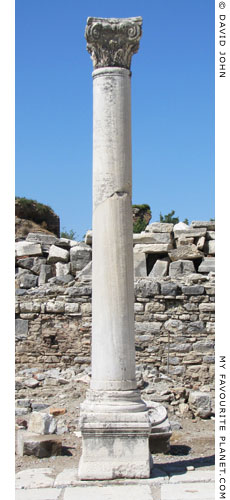
One of the columns of the
colonnade along the south
side of the Arcadian Way. |
| |
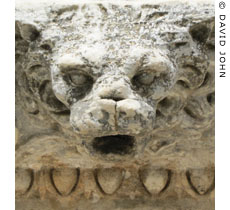
A lion head water spout from
an ancient building, displayed
on the site of the Theatre
Gymnasium, on the north
side of the Arcadian Way. |
| |
| |
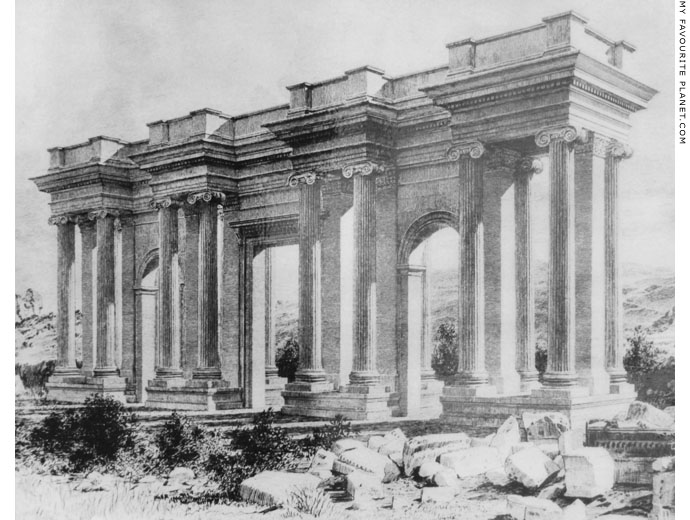
A reconstruction drawing, made in 1897, of the "middle harbour gate" of Ephesus,
with Ionic columns, built in the 1st quarter of the 2nd century AD. The gate marked
the beginning of the Arcadian Way from the harbour to the Great Theatre. |
| |
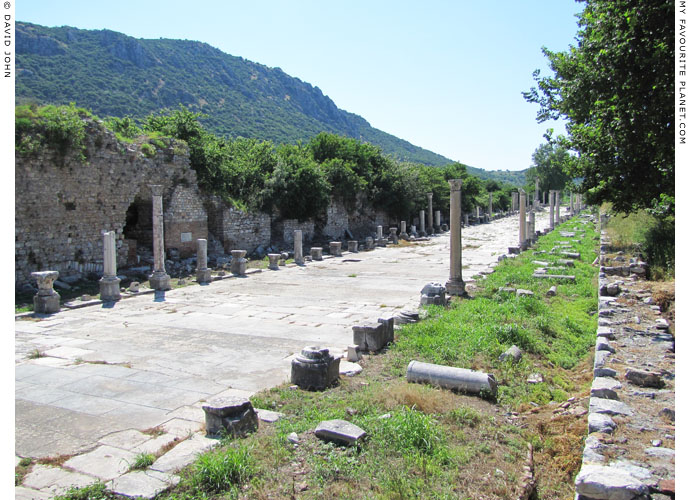
The view westwards (towards the harbour) along the Arcadian Way.
Doorways of shops punctuate the walls along either side of the
street, behind the coulmns of the colonnade. |
| |
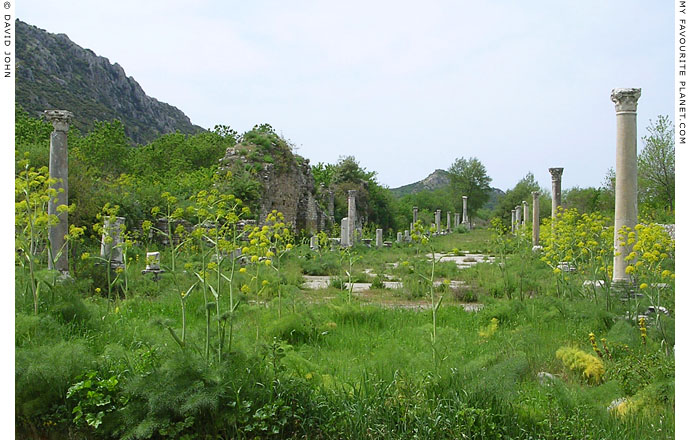
The Arcadian Way as it looked in 2004, before it was restored
and the grass and vegetation cleared away in 2012.
|
The clearance of the vegetation makes the layout and features of the street much clearer, even if visitors are not allowed to walk along it. It also makes the tasks of maintaining and protecting the ruins easier. Hovever, the greenery gave the street a kind of wild beauty. Gradually, ever more areas around the archaeological site are being tamed and defoliated. As a result, parts of ancient Ephesus are beginning to look more arid and stony, especially in summer.
In the backgound, left, is the north slope of Mount Koressos (Bülbül Daği, Nightingale Mountain), along the top of which the fortification walls of the city were built during the Hellenistic period. |
|
|
| |
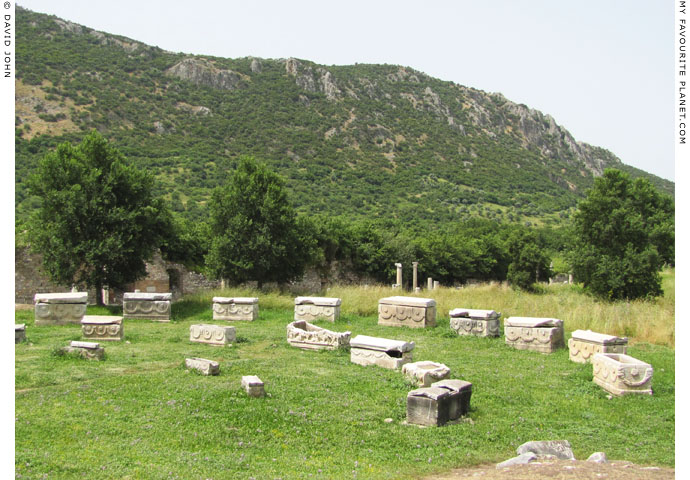
A recently opened grassy area on the north (right) side of the Arcadian Way exhibits
large sarcophagi from local necropoli, a sort of "sarcophagus park". Ephesus was a
production centre for such ornate, marble sarcophagi, many with standard designs
such as garlands and heads of animals and mythical figures. One, more expensive-
looking sarcophagus has reliefs of an Amazonomachy (see photo below).
See also sarcophagi from Ephesus decorated with heads of the Gorgon Medusa. |
| |
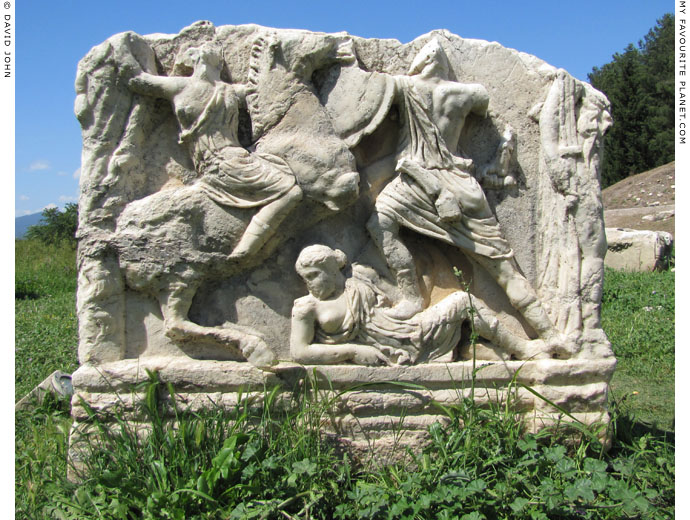
A relief of an Amazonomachy (a battle between Greeks and Amazons) on the end of a large,
marble sarcophagus in the "sarcophagus park", north of the Arcadian Way. Roman period.
Read about the myths of the Amazons in Ephesus on gallery page 22. |
| |
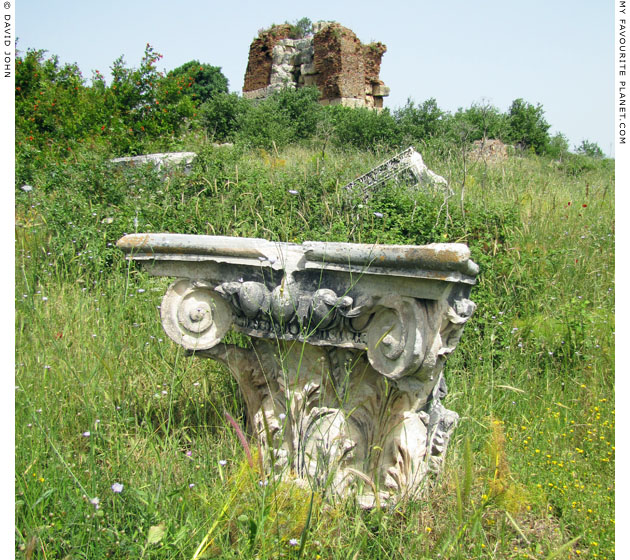
The remains of ancient buildings overgrown with flowers and grass at the northwest
end of the Arcadian Way, in the area of the Harbour Gymnasium and Baths.
|
This semi-wild, green area is reached by footpaths leading to the right from the main path between the lower site entrance and the Great Theatre, and from the Aghia Maria (Church of the Virgin). Very few visitors find their way here, as the ruins, architectural fragments, sarcophagi and inscriptions are not as enticing for most people as those of the main sights, and there is so much else to see. It is not on the itineraries of the tourist guides.
If you have the time, a detour here is a pleasant half hour ramble in an area where nature meets history, particularly beautiful in spring when the flowers are in bloom (see Ionian Spring Part 2 - Darling buds at The Cheshire Cat Blog). |
|
|
| |
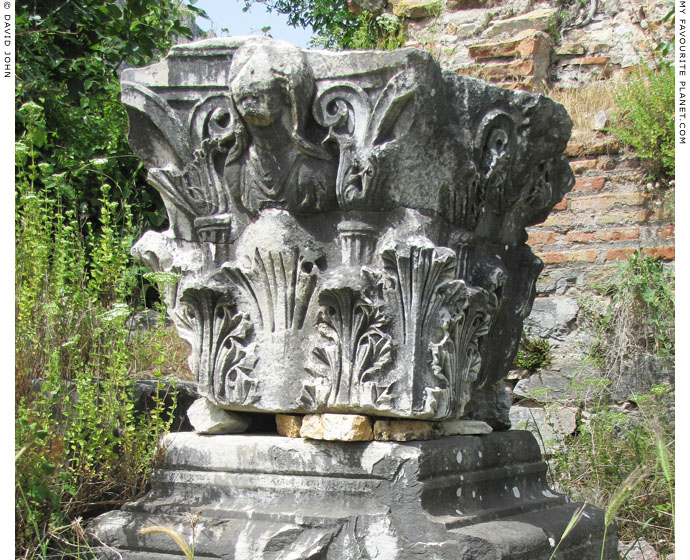
A colossal Corinthian column capital with a female bust, in the the harbour area. |
Photos, articles and map: © David John,
except where otherwise specified.
Additional photos: © Konstanze Gundudis
All photos and articles are copyright protected.
Images and materials by other authors
have been attributed where applicable.
Please do not use these photos or articles without permission.
If you are interested in using any of the photos for your website,
project or publication, please get in contact.
Higher resolution versions are available on request.
Some of the information and photos in this guide to Ephesus
originally appeared in 2004 on davidjohnberlin.de. |
|
| |
 |
Visit the My Favourite Planet Group on Facebook.
Join the group, write a message or comment,
post photos and videos, start a discussion... |
|
|
| |
|
|
|